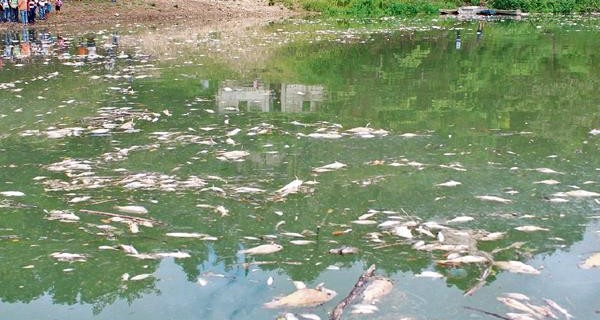March for Water and Land, March for Life
In Guatemala the March for Water and Land, called upon by the Committee of Campesino Unity, is challenging some of the most powerful interests at a national and international level: the extractive industry, agro-industry, the mining and hydroelectric industries. The March brought together both the rural and urban populations, as the entire population is affected by the mismanagement of water in the country.
The March for Water and Land started on April 11, organized by the People’s Assembly, which brings together forty farming, student and community organizations. More than five thousand people walked from San Marcos, Huehuetenango and Las Verapaces to the nation’s capital. The people from the most remote communities walked up to twelve days to demand a just law for the management of water. They shouted: “Water is a right, not a commodity!” During the length of the march they brought together thousands of people of all ages and ethnic groups for the defense of water and their land.
“Water is a right, not a commodity!”
The swathes of people grew as they passed through towns and cities, because the people throughout of the whole country suffer from the scarcity and contamination of water in Guatemala. In the places where they stopped for the night, the marchers were received with joy and solidarity. They were put up in community centers, schools and parks, entertained by marimbas and fed by the people who stood in solidarity with them. “It is poor people like us who give us food, because they know that this struggle is just and for the benefit of everyone”, stated Candelaria, a woman from a rural farming community who marched with her children from Tecun Uman, San Marcos.
The night of April 21 the marchers were received in the capital city with music and food. A pact of mutual commitment took place between the rural and urban people, because they recognize that water is a universal necessity and that united, as a people, they will be able to win this fight for the welfare of the community. In the last thirty years twelve legislative initiatives have been put forward for the equitable management of water, but groups of businesses, municipalities and local authorities have managed to prevent a fair law from being enacted. With this march the people showed their determination to achieve such a law.
April 22 was the last day of the March for Water and Land. More than fifteen thousand people came together in Constitution Plaza at midday. Representatives from the organizations presented themselves before various State agencies to demand strong action to preserve Guatemala’s water resources, the most contentious issues being: the re-routing of rivers by agro-industry, the contamination of water by mining and agro-industry, and the damming of rivers by hydroelectric companies. All of these actions have been authorized by the State, ignoring the will of the people expressed through consultations of the people of Guatemala.
Representatives from the organizations presented themselves before various State agencies to demand strong action to preserve Guatemala’s water resources, the most contentious issues being: the re-routing of rivers by agro-industry, the contamination of water by mining and agro-industry, and the damming of rivers by hydroelectric companies.
Daniel Pascual, a campesino (rural farm community) leader, reported that the pollution of La Pasión River in El Petén and the re-channeling of the Madre Vieja and Achiguate Rivers in Escuintla were the motivation for the national movement. The leader of the Campesino Unity Committee pointed out that the misuse of water effects the population in in their daily life, impedes the production of food, and destroys the national ecosystems. He emphasized that water is a common good that should benefit the whole population and help to guarantee life and health. He affirmed that while the Water Law is in the process of approval, the concession of mining licenses should be suspended and those that have been granted by the Consitutional Court to the detriment of the community should be annulled. He reasons, “Water is more valuable than gold, because water guarantees our life”.
Representatives of the People’s Assembly met in the Congress of the Republic with deputies from the directive board. These assured that they will give priority to the revision of the law proposals, so that a law favorable to the whole population may be composed and approved. They also met with personnel from the Supreme Court of Justice, whose president assured that the Court will follow up with the complaints put forward by advocates for human rights regarding the re-routing and drying out of the rivers. He will do so by working with the Attorney General for the Environment of the Public Ministry and the Ministry of Environment and Natural Resources. The heroic march achieved assurances from the authorities, although nothing concrete. Nevertheless, representatives of the Assembly affirm that the marching together has created bonds of respect and commitment that will allow for the prolonged resistance until a just Water Law is achieved.
Stay in the loop with Food First!
Get our independent analysis, research, and other publications you care about to your inbox for free!
Sign up today!


 Help Food First to continue growing an informed, transformative, and flourishing food movement.
Help Food First to continue growing an informed, transformative, and flourishing food movement.




